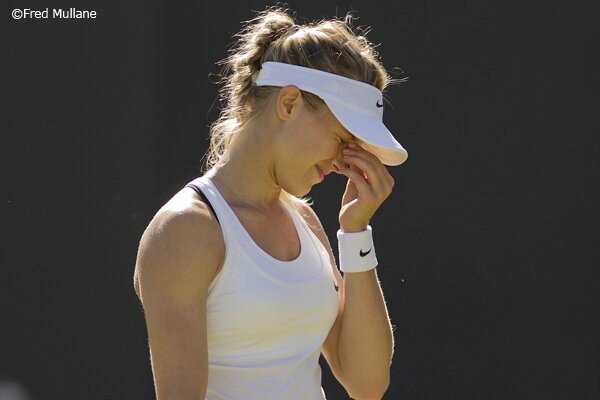By Sandra Harwitt
What a difference a year makes. An age old saying, but one that often tells the tale.
Take, for instance, the case of Eugenie Bouchard.
Last year, after being named the 2013 WTA Newcomer of the Year, Bouchard joined the upper echelon of the women’s game. In 2014, she reached her first two Grand Slam semifinals at the Australian and French Opens, and then became Canada’s first Grand Slam singles finalist here at Wimbledon, the place she won the 2012 junior girls’ title. She compiled a 43-21 win-loss record, won her first career WTA title at Nurnberg, and ended the year ranked No. 5. Everything was looking fabulous and her attitude, sometimes a bit too haughty for a young lass just out of her teens, was something of an entitlement deserved for becoming a Top 10 talent.
This year, however, it’s all fallen apart. That’s right – as good as Bouchard was in 2014 is as disappointing as she is in 2015. Her only positive results of the season were a quarterfinal showing at the Australian Open and a fourth round go at Indian Wells. Otherwise it’s been a series of troublesome defeats for a variety of reasons from playing poorly to playing injured. To date, she has a paltry 8-13 win-loss record on the year, and suffered her fourth first round departure at Wimbledon on Tuesday.
Playing with a Grade 2 abdominal strain the Wimbledon No. 12 seed was shown the exit in a 7-6 (3), 6-4 loss to No. 117 ranked Chinese qualifier Duan Ying-Ying. It’s an injury that has crept up before – often when she is stressing about her game.
After the injury resurfaced at Eastbourne, Bouchard sought medical advice and the prevailing opinion was she should stay off the court. As last year’s finalist she chose to ignore the experts and soldier on, although the decision had no return: “Probably wouldn’t have been smart to play here, but I couldn’t pass on Wimbledon. So I did kind of minimal preparation to save myself for the match….I was taped. Felt okay. I was trying not to think about it. But I just haven’t practiced that much. So I felt my timing was very off.
Bouchard can still deliver the attitude, clearly a defense mechanism these days as it was in April when she had a terrible outing at the Fed Cup playoff tie against Romania in Montreal. But clearly she’s maturing from the hard lessons of this season and she parked that part of her personality at the door for this press conference. She was polite, even-toned and seemingly honest with her replies.
She’s taken some really hard knocks the last 12 months and has done so under the microscope, which makes it a more ardous path to walk. On most occasions she’s looked confused and without confidence as she tries to find that old magic from last year during this year’s matches. She’s aware that this first round Wimbledon defeat will be costly, dropping her ranking from No. 12 into the 20s – most likely closer to the 30s.
If there’s a silver lining to the Bouchard scenario it’s that she isn’t the first player to go through a major slump after their first successful season on tour. Many of those players have come out of a similar circumstances all the better for it, and with a more comprehensive understanding of the role of being a high level competitor. Bouchard is hoping that will be her good fortune, and that when she returns to the court from the abdominal strain it will be for a fresh start.
“In a way I’m going to be kind of happy to put this period behind me, for sure,” she said. “Very disappointed in my last couple months. It has kind of been a stressful time, these big tournaments that everyone was talking about to me. I’m going to be looking forward to not having people ask me every single day about the points I have to defend. That will be nice.”



 30 Jun 2015
30 Jun 2015  Posted by Sandy
Posted by Sandy

